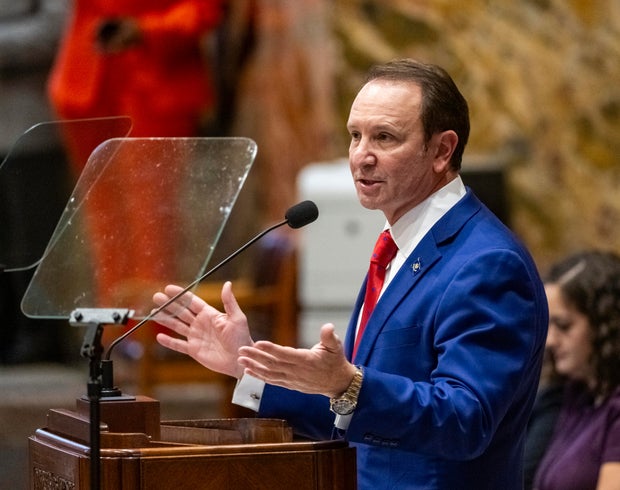CBS News
Lawsuit challenges Louisiana law requiring classrooms to display Ten Commandments

Civil liberties groups filed a lawsuit Monday to block Louisiana’s new law requiring the Ten Commandments to be displayed in every public school classroom — a measure they contend is unconstitutional.
Plaintiffs in the suit include parents of Louisiana public school children, represented by attorneys with the American Civil Liberties Union, Americans United for Separation of Church and State and the Freedom From Religion Foundation.
Under the legislation signed into law by Republican Gov. Jeff Landry last week, all public K-12 classrooms and state-funded universities will be required to display a poster-sized version of the Ten Commandments in “large, easily readable font” next year.
Opponents argue that the law is a violation of separation of church and state and that the display will isolate students, especially those who are not Christian. Proponents say the measure is not solely religious but that it has historical significance. In the language of the law, the Ten Commandments are “foundational documents of our state and national government.”
The lawsuit filed Monday seeks a court declaration that the new law, referred to in the lawsuit as HB 71, violates First Amendment clauses forbidding government establishment of religion and guaranteeing religious liberty. It also seeks an order prohibiting the posting of the Ten Commandments in public school classrooms.
The ACLU said its complaint represented “parents who are rabbis, pastors, and reverends.”
“The state’s main interest in passing H.B. 71 was to impose religious beliefs on public-school children, regardless of the harm to students and families,” the lawsuit says. “The law’s primary sponsor and author, Representative Dodie Horton, proclaimed during debate over the bill that it ‘seeks to have a display of God’s law in the classroom for children to see what He says is right and what He says is wrong.'”
The law, the complaint alleges, “sends the harmful and religiously divisive message that students who do not subscribe to the Ten Commandments —or, more precisely, to the specific version of the Ten Commandments that H.B. 71 requires schools to display— do not belong in their own school community and should refrain from expressing any faith practices or beliefs that are not aligned with the state’s religious preferences.”
Defendants include state Superintendent of Education Cade Brumley, members of the state education board and some local school boards.
Michael Johnson / AP
Landry and Louisiana Attorney General Elizabeth Murrill support the new law, and Murrill has said she is looking forward to defending it. She issued a statement saying she couldn’t comment directly on the lawsuit because she had not yet seen it.
“It seems the ACLU only selectively cares about the First Amendment —it doesn’t care when the Biden administration censors speech or arrests pro-life protesters, but apparently it will fight to prevent posters that discuss our own legal history,” Murrill said in the emailed statement.
The Ten Commandments have long been at the center of lawsuits across the nation.
In 1980, the U.S. Supreme Court ruled that a similar Kentucky law violated the establishment clause of the U.S. Constitution, which says Congress can “make no law respecting an establishment of religion.” The high court found that the law had no secular purpose but rather served a plainly religious purpose.
In a more recent ruling, the Supreme Court held in 2005 that such displays in a pair of Kentucky courthouses violated the Constitution. At the same time, the court upheld a Ten Commandments marker on the grounds of the Texas state Capitol in Austin. Those were 5-4 decisions, but the court’s makeup has changed, with a 6-3 conservative majority now.
Other states, including Texas, Oklahoma and Utah, have attempted to pass requirements that the schools display the Ten Commandments. However, with threats of legal battles, none has the mandate in place except for Louisiana.
The posters in Louisiana, which will be paired with a four-paragraph “context statement” describing how the Ten Commandments “were a prominent part of public education for almost three centuries,” must be in place in classrooms by the start of 2025. Under the law, state funds will not be used to implement the mandate. The posters would be paid for through donations.
The case was allotted to U.S. District Judge John deGravelles, nominated to the federal bench by former President Barack Obama.
CBS News
Suspect in Wisconsin school shooting was 15-year-old girl, 2nd grader called 911

Watch CBS News
Be the first to know
Get browser notifications for breaking news, live events, and exclusive reporting.
CBS News
Man stopped at border crossing with dead woman in car’s passenger seat, Croatia police say

Croatian authorities arrested an Austrian national on suspicion of trying to smuggle a corpse, after he was stopped at a border crossing with a dead woman riding in his car’s passenger seat, police said Tuesday.
The 65-year-old man was stopped at the Gunja border crossing with Bosnia in late November after presenting travel documents for himself and another passenger, police told AFP in a statement.
The officers then became suspicious after noticing the female passenger “was not conscious and was not communicating.”
Police called a coroner to the scene, who established that the passenger was dead.
Authorities said the 83-year-old woman had died in Bosnia, and the driver had tried to take her body to back Austria to “avoid formalities related to the transport of deceased,” the statement added.
Police did not elaborate on the relationship between the two, but local media has described the man as the deceased’s legal guardian.
Police said the case had been formally handed over to the country’s prosecutors.
Drivers in the U.S. have also been found with corpses in their vehicles for a variety of different reasons. Last year, a man in Texas was arrested after a man’s body was found inside his car nearly 40 miles away from where police there believe he was hit by the car.
In 2014, a Detroit-area man said he refused to stop and contact authorities after one of his passengers died during a drive to Michigan from Arizona because he feared being incarcerated if police investigated. Four years before that, police said a Southern California woman drove around for months with a homeless woman’s mummified body in her passenger seat.
CBS News
Rex Heuermann, alleged Long Island serial killer, due in court as prosecutors promise major development

RIVERHEAD, N.Y. – Accused Gilgo Beach serial killer Rex Heuermann is due back in court on Long Island Tuesday morning, and prosecutors are promising a major development in the case.
The hearing is set to begin after 9:30 a.m. A press conference is expected at the Suffolk County DA’s office shortly after. We will bring that news conference to you live on CBS News New York.
The judge has previously indicated he wanted to set a trial date at today’s hearing.
Heuermann’s last court appearance was back in October.
Heuermann accused of killing 6 women, so far
Heuermann, 61, has pleaded not guilty to murder charges in the deaths of six women between 1993 and 2011. The remains of 11 people were discovered around Gilgo Beach during that period, and investigators believe Heuermann may be linked to other killings. The Suffolk County DA has said there could be future indictments.
Four of the victims had their bodies disposed of near Gilgo Beach. Two others were murdered as far back as 2003 and 1993. Each of them had been involved in sex work.
Prosecutors allege Heuermann is linked to the murders through DNA, burner phone data, a description of his truck, internet searches and what they call a blueprint for how to get away with murder.
Attorneys wrangle over DNA, volume of evidence
A key point of contention in the new DNA evidence is called SNP, which prosecutors say links the hairs of victims to Heuermann. The defense has called an outside lab’s methods of genetic testing unproven and “magic.”
Another hurdle for prosecutors is the sheer volume of evidence. The DA says they’re struggling to keep up with the costs of processing the 120 terabytes of data and 400 electronic devices seized.
Heuermann’s attorney says his client is looking forward to his day in court and will be pursuing a change of venue, claiming the jury pool in Suffolk has been “poisoned.”
Heuermann remains in isolation in jail.










